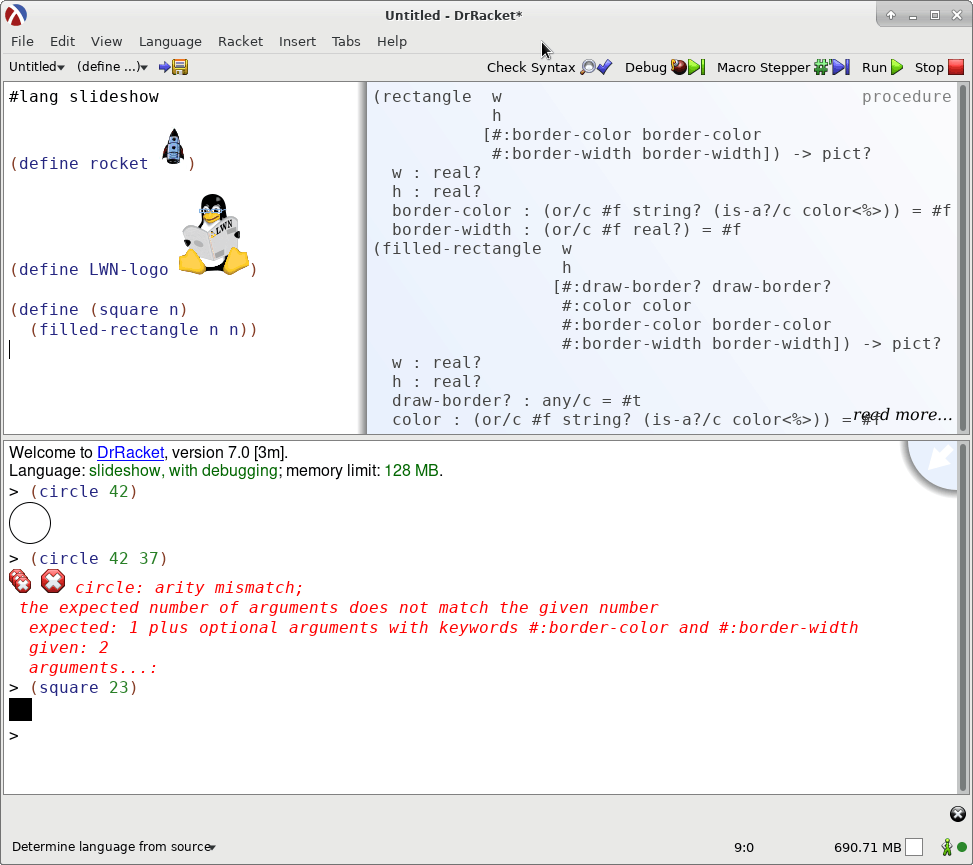 Racket is een ontwikkeltaal waarmee andere ontwikkeltalen ontwikkeld kunnen worden. Daarnaast kan gewoon in Racket zelf ontwikkeld worden. Het stond eerder bekend onder de naam PLT Scheme en komt uit de Lisp-Scheme-familie. Voor de achtergrond verwijzen we naar het manifest, geschreven onder leiding van Matthias Felleisen. De ontwikkelaars hebben versie 8.4 van Racket uitgebracht en de changelog van die uitgave ziet er als volgt uit:
Racket is een ontwikkeltaal waarmee andere ontwikkeltalen ontwikkeld kunnen worden. Daarnaast kan gewoon in Racket zelf ontwikkeld worden. Het stond eerder bekend onder de naam PLT Scheme en komt uit de Lisp-Scheme-familie. Voor de achtergrond verwijzen we naar het manifest, geschreven onder leiding van Matthias Felleisen. De ontwikkelaars hebben versie 8.4 van Racket uitgebracht en de changelog van die uitgave ziet er als volgt uit:
Changes in Racket version 8.4:
- Command-line Racket provides a new expression editor by default for its read-eval-print loop (REPL). The new REPL is based on the Chez Scheme expression editor, but extended to use the same language-sensitive syntax coloring and indentation tools as DrRacket.
- Typed Racket adds a kind system, preventing programmers from writing nonsensical type expressions. It checks whether type constructors are correctly applied to arguments, and separates type constructors from polymorphic types. The
:kindform enables checking the kind of a type expression at the REPL. The new system also correctly rejects some ill-formed recursive types.- Racket has a
file-or-directory-statfor unified information about file-system objects.- DrRacket shows the region affected by an
#;S-expression comment by fading the commented-out region.- Racket on Chez has faster multiplication and division for some numbers.
- Web server: The files dispatcher supports all standard caching-related HTTP response headers (e.g., Cache-Control).
- Web server: A new dispatcher captures the common pattern of processing HTTP requests and responses in a layered fashion.
- The Web Server supports use of the Cache-Control header, and includes a new wrapping dispatcher.
- Expander: add “portal” syntax to support new forms of syntax object binding.
- Documentation search is improved.
- Some hash operations support an optional
try-order?argument.- The plot-metrics interface has documentation.
- Fonts support OpenType feature settings.
- The Gui library has improved support for Wayland.
- The computation of quadratic roots is further improved.
- The
set/ccontract adds support for random generation.- DrRacket’s interactions window supports #lang-specific coloring and indentation.
- DrRacket’s parenthesis-based keyboard shortcuts change based on the parentheses that each different #lang uses.
- The release includes many other bug repairs and other improvements!


:strip_exif()/i/2003576746.png?f=thumbmedium)